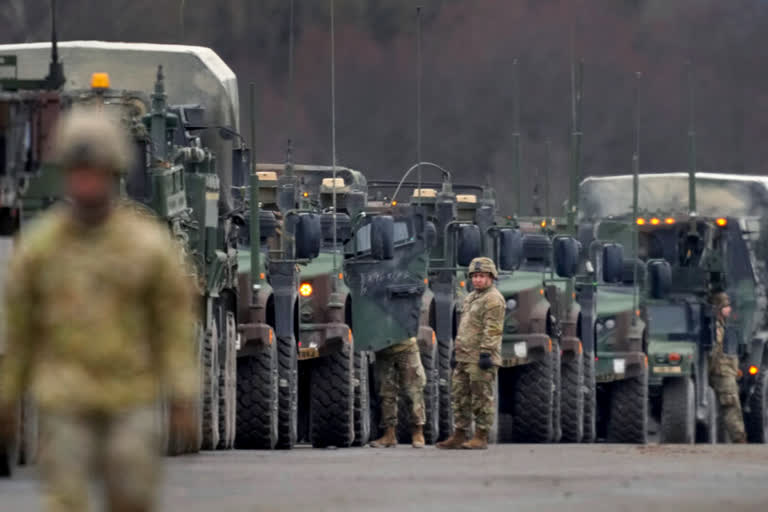London: Britain's top diplomat heads to Moscow on Wednesday to try to defuse tensions raised by Russia's military buildup near Ukraine, warning that an invasion would bring "massive consequences for all involved."
"Russia has a choice here. We strongly encourage them to engage, de-escalate and choose the path of diplomacy," Foreign Secretary Liz Truss said ahead of departing on the first visit to Moscow by the U.K.'s top envoy in more than four years. Russia has massed over 100,000 troops near Ukraine's border and has launched military manoeuvers in the region, but says it has no plans to invade its neighbour. It wants guarantees from the West that NATO will not allow Ukraine and other former Soviet nations as members, that the alliance halt weapon deployments there, and that it roll back its forces from Eastern Europe. The U.S. and NATO flatly reject these demands.
Western nations say they will impose their toughest-ever sanctions on Russian businesses and individuals if Moscow invades Ukraine. "Russia should be in no doubt about the strength of our response," said Truss, who will meet Foreign Minister Sergey Lavrov during the two-day visit. Truss urged Moscow to abide by its international agreements that commit it to respecting Ukraine's independence and sovereignty.
Western leaders in recent weeks have engaged in multiple rounds of high-stakes diplomacy in hopes of de-escalating the crisis. French President Emmanuel Macron held over five hours of talks Monday with President Vladimir Putin in Moscow before meeting with Ukrainian President Volodymyr Zelenskyy in Kyiv the next day.
Macron said that Putin told him he would not initiate an escalation, but also acknowledged that it will take time to find a diplomatic solution to the biggest security crisis between Russia and the West since the Cold War. He later flew to Berlin to meet with German Chancellor Olaf Scholz and Polish President Andrzej Duda, and they urged de-escalation by Russia and that it engage in a meaningful dialogue on European security.
On Wednesday, Spanish Foreign Minister José Manuel Albares visited Kyiv to meet with his Ukrainian counterpart, Dmytro Kuleba. Afterward, Albares reiterated that dialogue and de-escalation should be the priorities. Kuleba urged more sanctions against Russia and said "there is a chance to resolve the crisis through diplomatic means."
Scholz is expected in Kyiv and Moscow on Feb. 14-15. He met Monday with U.S. President Joe Biden, who vowed that the Nord Stream 2 Russia-to-Germany gas pipeline will be blocked in the event of an invasion. Such a move against the pipeline, which has been completed but is not yet operating, would hurt Russia economically but also cause energy supply problems for Germany.
Russia's Deputy Foreign Minister Sergei Ryabkov criticized the U.S. and its allies for turning the Nord Stream 2 "into an instrument of pressure on Moscow" and called recent statements about it "a political circus."
Japan has decided to divert some of its gas reserves to Europe amid growing concern over possible disruptions of supplies due to the crisis, said Japanese Economy, Trade and Industry Minister Koichi Hagiuda. The decision was made at the request of the United States and European Union.
